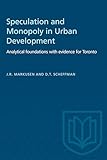Speculation and Monopoly in Urban Development : Analytical foundations with evidence for Toronto / David T. Scheffman, J.R. Markusen.
Material type: TextSeries: HeritagePublisher: Toronto : University of Toronto Press, [1977]Copyright date: ©1977Description: 1 online resource (176 p.)Content type:
TextSeries: HeritagePublisher: Toronto : University of Toronto Press, [1977]Copyright date: ©1977Description: 1 online resource (176 p.)Content type: - 9780802033482
- 9781487579692
- 333.77130971 19
- HD257 .M375 2018
- online - DeGruyter
| Item type | Current library | Call number | URL | Status | Notes | Barcode | |
|---|---|---|---|---|---|---|---|
 eBook
eBook
|
Biblioteca "Angelicum" Pont. Univ. S.Tommaso d'Aquino Nuvola online | online - DeGruyter (Browse shelf(Opens below)) | Online access | Not for loan (Accesso limitato) | Accesso per gli utenti autorizzati / Access for authorized users | (dgr)9781487579692 |
restricted access online access with authorization star
http://purl.org/coar/access_right/c_16ec
The recent rapid rise in land and housing prices in Canadian cities has generated much public concern. It is widely supposed that prices have been inflated by monopolistic developers, an assumption that has never been adequately tested. This study evolves a model of the land development process which includes a new theory of land pricing giving special emphases to market structure, speculation, and taxation. It then applies the model to the first fully documented examination of the Toronto land market, presenting specific original data on ownership and land assembly. The history of the conversion of farmland to residential use in four recent Toronto subdivisions permits a close look at the activities and profits of speculative middlemen and at the length of time developers buy land prior to subdividing. The results indicate that Toronto real estate is not controlled by a few large developers, that ownership concentration is too low to imply market power even if all companies with overlapping corporate control are treated as a single firm. The authors suggest that rising prices have been caused by unforeseen increase in demand, shortages of municipally provided trunk service capacity, especially sewers, and frequent municipal reluctance to grant subdivision approvals. The book concludes with a general consideration of the role of government in land development and a number of specific policy recommendations concerning the subdivision approval process, the Ontario Land Speculation Tax, and public land banking. This study will be of great interest to urban geographers and economists, to urban planners and policy-makers, and to representatives of development corporations and urban reform groups.
Mode of access: Internet via World Wide Web.
In English.
Description based on online resource; title from PDF title page (publisher's Web site, viewed 01. Nov 2023)


